By Peter Weis @PeterVicey
In this installment, we’ll lend some extra attention to both the Frankfurt-Stuttgart and Dortmund-Glabach results in our “Burning Questions” section.
Those four teams are joined by Union Berlin, Hoffenheim, Mainz, Bayern, Köln, Freiburg and Darmstadt in receiving draw-ups on the tactics boards this week.
As always, there’s much to discuss over on the world’s best footballing beat! Come along for a look at all nine fixtures.
| Maximilian Mittelstädt | Jeollo von VfB-exklusiv.de CC-BY-SA-4.0 |
Bundesliga Tactical Banter: Round 12
“Everybody Loves Xabi”
It happens to be one of those weeks when there simply isn’t much newsworthy to pull out of the latest victory for table-toppers Bayer 04 Leverkusen. Germany’s red company team handled themselves calmly and professionally in a fairly easy 3-0 win over SV Werder Bremen. SV head-coach Ole Werner maintained his usual 3-5-2. Bayer trainer Xabi Alonso saw no need to alter his regular 3-4-3. When the team-sheets were released – with midfielder Robert Andrich taking the place of central defender Jonathan Tah – it appeared for a moment as if there might be a shift.
Andrich nevertheless quickly settled into Tah’s position and die Werkself tended to “business as usual”. The Rhinelanders remained imperious throughout, though some of the issues plaguing the squad remained apparent. One notes that – just as was the case leading up to the international break – lead-striker Victor Boniface continues to exhibit profligacy in front of goal. It mattered not. Leverkusen obtained an early lead after an own-goal from Bremen winger Olivier Deman. The powerful B04 wingback duo of Jeremie Frimpong and Alejandro Grimaldo then added their own tallies.
Everything unfolded as expected. After the full-time whistle, it came time for everyone associated with the winning team to gush over their Spanish trainer. Granit Xhaka and managing director Simon Rolfes followed the lead of a Friday interview from star German phenom Florian Wirtz in their post-match comments. Yes, it’s all a gigantic mutual love-fest. Germans love Xabi. He sends us his love back. Everyone’s happy. One could describe the current state of affairs with a vulgar reference to an exclusively male collective activity, but the columnist will leave that to the reader’s imagination.
“Everybody Loathes Leipzig”
Bundesliga diehards naturally didn’t harbor a great deal of sympathy for either side in Saturday’s Wolfsburg-Leipzig duel at the Volkswagen Arena. Easily the best part about the fixture itself was that – barring a draw – German football lovers would have a bit of Schadenfreude to relish in. Had Niko Kovac not produced a satisfactory result against the visiting German Red Bulls, it’s highly likely that one of the league’s most maddening trainers would have been sacked. If Kovac could lead the team to victory, we’d experience some warm nostalgia emanating from Leipzig’s DFB-Pokal elimination.
The final result spared Kovac the axe, left RB trainer Marco Rose in an pissy mood, and delivered us some pleasant Schadenfreude whilst listening to “Germany Killing” Austrian international Christoph Baumgartner conduct his post-match interview. The columnist should note that the German national team’s loss to Austria over the international break counts as a national tragedy of the the most epic proportions. Germany is never supposed to lose against Austria. It’s as embarrassing as getting beat up by one’s little sister. Kovac managed to do us a favor here.
Kovac switched his tactics again. This time Maxence Lacroix, Ridle Baku, Matias Svanberg, Lovro Majer, and Vaclav Cerny replaced Joakim Maehle, Maximilian Arnold, Kevin Paredes, Jakub Kaminski, and Tiago Tomas. The previous 4-2-3-1 returned to the 3-4-3 that the VfL trainer successfully used against Leipzig in the Pokal. Exactly as was the case in the Pokal, Kovac can count himself lucky that it worked. RB keeper Janis Blaswich suffered a lapse on Jonas Wind’s opening goal. Rogerio scored the winner against the run-of-play. Sebastiaan Bornauw somehow escaped giving Leipzig a penalty.
The overall xG stats tell the story of this one. Wind turned in an overall above average performance for “die Wölfe”, but everyone else in neon green wasn’t really on the level. Furthermore, Wind’s Danish compatriot Yussuf Poulsen outshined him at every turn. Baumgartner, Benjamin Henrichs, Xaver Schlager, David Raum and the absurdly good Xavi Simons all brought their top game in the loss. Germans have VfL keeper Koen Casteels to thank for delivering this little piece of Schadenfreude. The better team definitely didn’t win.
“Indefensible Bochum/Heidenheim”
Popping last round’s 0-0 draw between Darmstadt and Mainz off its perch as potentially the worst Bundesliga game of the season, we have the first Sunday offering of the current round. Very little action at the Voith Arena as Frank Schmidt’s 1. FC Heidenheim and Thomas Letsch’s VfL Bochum delivered a goalless dud. Kersplat. German football boosters harbored a bad feeling headed into this one. This encounter between two relegation pack teams had goose-eggs written all over it. Unwatchable. Unforgivable. Impossible to sell, compel, or re-tell
Bochum have now produced seven draws through 12 rounds, four of which have featured only one goal and now two that featured none. The author ordinarily prides himself on according “Graue Maus” teams their fair share of attention. Bochum have in fact received draw ups in the last two installments of the column. This time there truly is nothing to say about a team that almost seems uninterested in its own fate. Blah, blah, blah. Kevin Stöger, Patrick Osterhage, and Takuma Asano were good again. Not nearly good enough for this division.
As for Heidenheim, Tim Kleindienst missed a sitter. Nicola Dovedan floated a weak effort over towards Manuel Riemann’s goal-line so soft that the VfL keeper had enough time to trot back and grab it off the line. Eren Dinkçi involved himself well in some attack charges. Florian Schöppner and Lennard Maloney ran hard again. More blah, blah, blah. These are the exact talking points already covered with respect to this team in recent weeks. Nothing new at all from either of these team. The writer’s mood darkens. Try something else or get out of the top flight!
The “Burning Questions”: Round 12
Was the “Top-Spiel” interesting?
Hell yes! Madly interesting. Eintracht-Stuttgart proved interesting, if not somewhat disconcerting, on every last level. Two major stories – the ACL tear suffered by match official Felix Brych and the SGE ultras protesting the gratuitous use of tear gas by the Frankfurt police outside the stadium – merit coverage before we even get to the action on the pitch. The unfortunate news regarding Brych to break on Sunday rules the veteran ref out for the year. As for the riots at Deutsche Bank Park, Eintracht remain silent on the matter as most of the questions remain unanswered. Accounts vary wildly and there’s little verifiable information beyond edited clips on social media. Reliable local sources do report over 100 injuries on both sides. More we cannot say.
Regarding the match itself, “tactics heads” reveled in a highly intriguing chess-match between SGE trainer Dino Toppmöller and counterpart Sebastian Hoeneß. As soon as the team sheets were released, the mind-games were on. Toppmöller – as reported in both of Frankfurt’s major German papers-of-record – felt his team needed to tighten up defensively following last round’s outing against Bremen. The Eintracht shift to a back-four could be explained in that context. The author personally believes that Toppmöller wished to catch Hoeneß unawares, just like he did against Hoffenheim four rounds back.
Lineup—Frankfurt—Match 12 (4-3-3)
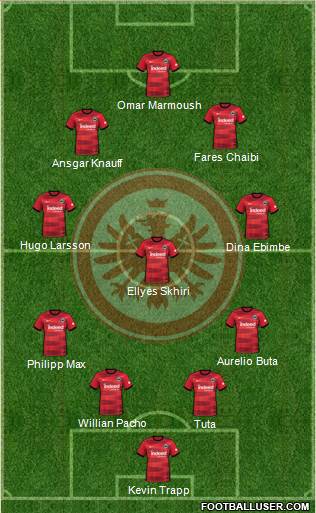
Precisely as was the case against Hoffenheim four rounds back, the Hessians ended up conceding a very early goal. Deniz Undav struck three minutes earlier than Maximilian Beier this time. Not even 60 seconds had elapsed before Undav – courtesy of some ultra fine prep work from Maximilian Mittelstädt and Enzo Millot. Hoeneß justifiably saw no reason to alter his 4-4-2 opening hand from last week. This paid immediate dividends. The Swabians sliced right through the noticeably thinner Eintracht midfield.
The hosts refused to allow themselves to be shocked both by the early goal and the fact that their ultras completely walked out on them. Slowly and steadily, Toppmöller’s crew began to mount up pressure. VfB keeper Alexander Nübel made a fine save on new XI addition Dina Ebimbe in the 8th. Ansgar Knauff had a couple of cracks. The 1-1 finally arrived in the 26th when Waldemar Anton inadvertently deflected a Philipp Max cross into his own net. The equalizer didn’t come against the run-of-play at all. Eintracht were rising.
Hoeneß’ Württembergers punched back with their own steady spell of pressure. At no point could Stuttgart be accused of slacking in their press. Frankfurt played through it well enough during their period of ascendancy, but Hoeneß never ordered the troops back. Mittelstädt and Chris Führich ultimately laid the groundwork for Undav’s second at 45+1. Undav goals at the very beginning and end of the first-half, according to some sources, served as a unique occurrence in German top flight history. No other player managed that in 60 years.
Unfortunately, Undav’s completion of a brace constituted the last goal that we would witness in the fixture. Führich – who experienced some problems finishing last time around – blew an excellent opportunity shortly after the restart. So too did Mittelstädt. Toppmöller, having seen enough, was the first coach to pull the trigger on a tactical change. Niels Nkounko relieved Max in the 55th. Given that we’ve seen the new summer arrival line up all over the left side this season, the coming shift wasn’t easily foreseeable.
Lineup—Frankfurt—56th minute (3-4-3)
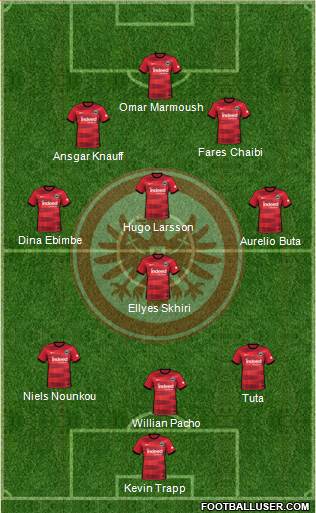
As soon as Dina Ebimbe moved over to the left, it became apparent that Toppmöller ordered a return to the back-three. The ball was now in Hoeneß’ court. Serhou Guirassy and Josha Vagnoman checked in for Führich and Jamie Leweling at the hour-mark. In all honesty, the columnist found the VfB shape a little difficult to nail down. Mittelstädt remained very much on the move, as did Vagnoman. A back-three or back-five? Hard to tell. Based on the fact that Anton moved center and Angelo Stiller/Atakan Karazor pulled back in unison, we’ll go with this.
Lineup—Stuttgart—61st minute (5-4-1)
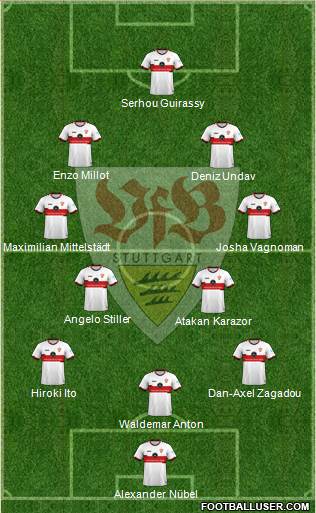
A certain fluidity to the later formations of both coaches suggested far more nuance. On the Frankfurt side, Fares Chaibi switched places with both SGE wingbacks rather often. Things got really crazy on the top Eintracht line when Mario Götze and Paxten Aaronson came on for Knauff and Aurelio Buta. Götze supplied some fine moves from his support axis position. Toppmöller’s revamped attack narrowly missed a set-up of lead striker Jessic Ngankam (on for Omar Marmoush) two minutes from the end of normal time.
Stuttgart’s shape got more interesting when Silas entered for Undav in the 80th. On some attack charges, the Congolese attacker appeared to operate as a second striker alongside Guirassy. Both African internationals had chances to score a cushion goal. The scoreline nevertheless held. For the second successive week, we discuss a Stuttgart side not performing anywhere near where their xG metric implies they should be. That hardly holds any real relevance as the points secured place them in an excellent position.
VfB prospects moving forward?
Still incredibly positive. No one stationed in the defensive corps played an especially bad match. Führich’s finishing problems – along with a predictable dip for the very mortal Jamie Leweling – can be treated as aberrant. Hoeneß’ tactical acumen continues to shine through. If one accepts the designation of this fixture as a “chess-match”, evidence conclusively demonstrates that the VfB trainer out-maneuvered Toppmöller. One should continue to keep an eye on Mittelstädt and Vagnoman in the coming weeks. Hoeneß clearly has plans for them; or so says a columnist constantly trying to crawl into his head.
Eintracht prospects?
Mostly good. The attacking trio of Marmoush, Chaibi, and Knauff failed to excite in this particular match; at least insofar as the scoresheet is concerned. Those of us keeping close tabs on them still owe them plaudits for their pace and creativity. The fact that this trident isn’t exactly comprised of the tallest players means that Markus Krösche absolutely must deliver by signing more classic strikers during the coming transfer window. Signs point to the SGE administrator coming through on that front. Defensive upgrades should also be on the agenda. Krösche doubtless has cash on hand for that.
How did Dortmund find their feet?
After careful scrutiny, the author believes it came via a highly simplistic match-plan. BVB trainer Edin Terzic stuck with one the most basic of all footballing constellations throughout. Importantly, he kept it in place even after everything initially went awry. The 4-2-3-1 formation remained in place throughout the full 90 minutes. Terzic trusted his team to turn matters around. The patience paid off in a big way. The respective trainers in the “Battle of the Borussen” found themselves discussing a familiar result. Dortmund beat the foals at home again.
Lineup—Dortmund—Match 12 (4-2-3-1)
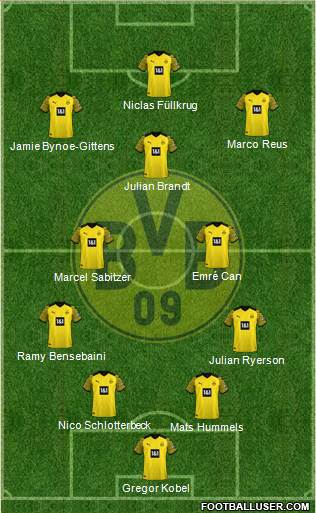
Four changes to the previous XI saw Jamie Bynoe-Gittens, Emré Can, Marco Reus, and Ramy Bensebaini replace Karim Adeyemi, Salih Özcan, Felix Nmecha, and Niklas Süle. The obvious enough idea revolved around allowing the two sixes to handle vertical impetus whilst Julian Brandt did his thing as a flexible ten. Terzic correctly deduced that BMG trainer Gerardo Seoane would make no changes to the 4-4-2 that successfully rolled over Wolfsburg. This proved partially correct. The once-again fit Jordan took over for Tomas Cvancara. Alassane Plea re-positioned slightly.
Lineup—Gladbach—Match 12 (4-4-2)
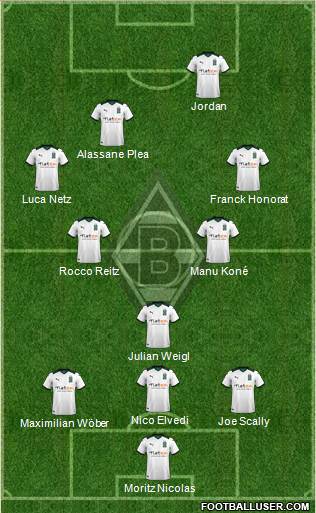
If anything, this stagger (Plea qualified as what Germans refer to as an “anhängende Spitze” or “hanging edge”) slowed the Gladbach approach play somewhat. A direct approach on the ball was neither flashy nor particularly flashy. With some degree of pain, BVB enthusiasts surely noticed that their team still had trouble keeping up with this. Manu Koné played Luca Netz through in the 3rd and the young, recently, converted winger forced keeper Gregor Kobel into an early parry. A quick answer from Bynoe-Gittens failed to inspire much as Jordan was also knocking on the door prior to the opening goal.
The 2-0 BMG lead
Plea split the Dortmund defense on a quick counterattack leading up to the 1-0 in the 13th. A set script seemed to be unfolding as budding German talent Rocco Reitz powered past the center backs and finished strongly. Nico Schlotterbeck looked awful on the coverage. Germany’s supposed future star in defense got completely toasted by the “next big thing”. Ouch. Only a slightly offside Plea kneecap cap Gladbach from going up 2-0 six minutes later. Netz nearly set up Jordan again before Koné officially netted the 2-0 in the 28th; an equally embarrassing goal from a BVB perspective.
No one in black-and-yellow could be bothered to mark the French midfielder when he slotted home off a Franck Honorat corner. BVB sporting director Sebastian Kehl acknowledged that the horribly late tackling from his side was atrocious in his post-match interview. It genuinely appeared as if the wheels were coming off. had the scoreline held, Terzic would have been preparing to file an unemployment claim tomorrow morning. Miraculously enough, the hosts managed to complete a “blitz comeback” before the weather conditions ended up shutting this match down.
Dortmund’s “wake up” call
Marcel Sabitzer capped a quality counterattack with a lovely finish at the half-hour-mark. Koné was actually culpable with a ball loss in the lead-up. Niclas Füllkrug added the equalizer two minutes later. Ramy Bensebaini – hitherto experiencing a horrible match on both sides of the ball – got a chance to involve himself positively with a pre-assist. The formal assist belonged to Bynoe-Gittens, who was up to that point the strongest of Terzic’s actors on the pitch. Bynoe-Gittens notched his own tally on the 3-2 in when Füllkrug returned the favor in the 45th. A half-time lead worked wonders.
As noted above, an unforgiving and unremitting torrent of rain impeded the flow of this match considerably. Nothing much transpired in the 13-minute-span between the second and third Dortmund goals. A brief attacking spurt after the restart enabled Bynoe-Gittens and Füllkrug to bid for braces. Matters seized up less than ten minutes into the second half, however. Dortmund – with Brandt and the subbed on Giovanni Reyna sometimes working the midfield step-stone seen in the recent Pokal fixture – weren’t threatening from open play. Reus did strike the crossbar off a free-kick.
Seoane’s final re-format
Luckily for Gladbach, their hosts couldn’t really capitalize on the fact that the fraying defensive line kept making increasingly more mistakes in the final 20 minutes. Seoane’s last play at stealing a point from this one came into focus shortly after his fifth and final substitution. The BMG trainer’s first change was born out of necessity. One regrets to report that Jordan couldn’t carry on for the second 45 due to injury. Sigh. Will Jordan and Cvancara ever be used together? It somehow seems as if the universe conspires against them being concurrently fit.
Lineup—Gladbach—83rd minute (4-3-3)
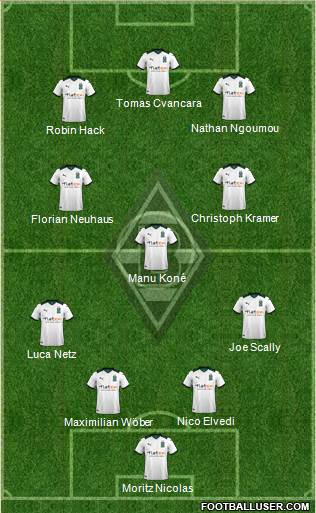
Christoph Kramer literally came within millimeters of scoring the equalizer shortly before Donyell Malen took advantage of the fact that Moritz Nicolas had vacated the net and buried the 4-2 at 90+7. The encounter wrapped with Dortmund enjoying a 3:1 xG ratio and an, albeit very slight, advantage in all other major statistical categories. The “fighting spirit” of the comeback victory at a bare minimum left the three points feeling earned. We’ll nevertheless proceed with all due caution when moving onto the vitally important question this section really poses.
Have Dortmund really found their feet?
Five years into writing this column, the author knows full well not to draw major conclusions when it comes to the Bundesliga’s perennial also-rans. Shall we undertake a quick flit to points over the last four seasons? How about Erling Haaland’s debut match in January 2020? That convincing win over Julian Nagelsmann’s Leipzig under Terzic one year later? Donyell Malen’s hat-trick of assists one year after that? Or maybe that other convincing 5-1 crushing of Freiburg in early February of this year? A few cherry-picked examples barely scratch the surface of this problem.
As one can tell from the timing of all four of these examples, the basic point the author wishes to underscore is that it’s too early to answer that question. Let’s get to it in the early stages of the next calendar year. Many moving components insofar as Dortmund are concerned at the moment. Something the columnist was interested to learn this week was that Malen snapped a goalless run dating back to match-day four with his late goal. What? Since when has the Dutchman been slumping? It feels like we were just heaping praise on him.
For the moment we can say that the nixing of Dortmund’s title hopes in the German press was hyperbolic. Duh. Everyone knew that already. Beyond that, history teaches us that Dortmund remain prone to death by lighting strike at any given moment. Duh. Everyone knew that too. It’s just too early. Give the writer some time to assess which players are truly headed in which direction. All of us Germans currently pay less attention to Dortmund this year as – to our delight – there are actually many other interesting Bundesliga stories this year.
Dortmund must move back in the queue.
What’s new with the FCU?
Well. The capital city’s Köpenick side avoided their 10th consecutive league loss via a 1-1 draw on Saturday afternoon. That’s certainly new. Germans are also pleased to welcome the top flight’s first ever female assistant coach. That’s both new and cool. We all presently root for Marie-Louise Eta, particularly in light of the fact that our Women’s national team needs a new “Bundestrainerin”. The recent sacking of Martina Voss-Tecklenburg fits this hellishly horrific year for German football. The denizens of the Bundesrepublik routinely sink into catatonic depression when the topic of our national teams comes up.
Getting back on tangent, Union played a largely solid match in front of their hometown fans at the Stadion An der Alten Försterei. As predicted, the new interim coaching regime didn’t tinker too much with the departed Fischer’s tactics. The back-three remained in place. Much of the approach play revolved around re-inserted wingbacks Robin Gosens and Christopher Trimmel. Kevin Volland worked as a ten behind a two-striker set. Janik Haberer and Aïssa Laïdouni brought familiarity to an attack supporting axis, though they were deployed father back.
Lineup—Union Berlin—Match 12 (3-4-1-2)
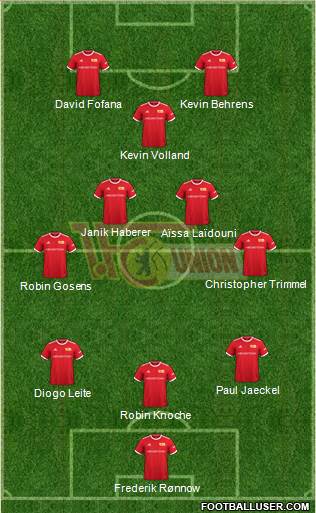
Strikers Kevin Behrens and David Datro Fofana encountered difficulty beating FCA keeper Finn Dahmen on some early chances. Augsburg themselves – with Iago and Arne Engels occupying the winger positions in Jess Thorup’s standard 4-2-3-1 – were a little slow to start. Gosens gifted the Fuggerstädter a chance to go ahead with a foul on Engels inside the area in the 36th. Skipper Ermedin Demirovic converted the 1-0. It again looked to not at all be Union’s day when Robin Knoche missed a chance to equalize from the spot in the 58th.
As they have many times during this horrible run-of-form, die Eisernen refused to give up. Gosens tried in vain to redeem himself with a pair of chances. Like-for-like substitutions from interim trainer Marco Grote and his team produced nothing. A change in the FCU shape wasn’t discernible until Grote put it all on the table with an offensive/defensive switch in the 86th. Striker Benedict Hollerbach relieved defender Diogo Leite. The late-match reformat didn’t produce the equalizer. That came off a dead ball. It was nevertheless interesting.
Lineup—Union Berlin—86th minute (4-3-3)
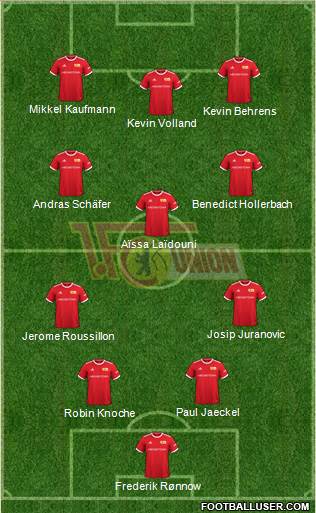
Something for the future perhaps? Volland can work effectively as a false-nine. Hollerbach – or for that matter Mikkel Kaufmann – stand to benefit from more rearward deployments. The return of Andras Schäfer potentially boosts the support axes. When Rani Khedira returns from suspension, the squad captain can probably pull the strings in midfield from a more advanced position with a patch of grass reserved for him exclusively. If there ever was a team that needed a back-four re-format, it’s this one.
Potential momentum builds
Volland scored – in all seriousness – Union’s first league goal since the current campaign’s seventh match-day. A huge initial hurdle gets cleared. The set-piece design (Knoche laying off a Josip Juranovic cross for the waiting Volland) also proves that the interim team did well to both drill the team on the training pitch and reserve the best item in the playbook for precisely the right moment. All of the news (in some cases false) breaking this weekend necessitated a re-writes in this section. The author liked the idea of sticking with this interim coaching team for a while. We now know that won’t happen.
The Union side we lavished praise on early in the season continues to be faintly visible whenever this team plays. Fofana and Volland still possess enormous potential, as does the up-to-this-point total flop Brenden Aaronson. Behrens showed flashes of his old form and Paul Jaeckel turned in his second consecutive promising performance in the defensive ranks. The league road leading up to the winter break remains a hard one. Bayern and Gladbach await. This poor club will also be thoroughly relieved when their Champions’ League disaster comes to end following matches against Real and Braga.
The calendar year concludes with winnable league fixtures against Köln and Bochum. Nenad Bjelica counts as an interesting appointment in that the former 1. FC Kaiserslautern midfielder doesn’t exactly have a record of sustained success in his nine separate coaching appointments. The Croatian looks to be the type of personality eager to shake things up. Some system needs to be in place by the time the final two matches just before Christmas come. Anything short of six points in the 16th and 17th rounds casts doubt on the decision to install him. Union can’t finish up the year in the relegation zone.
Who should have won the capper?
Thankfully, the second Sunday fixture offered us much more entertainment value than the first. As the headline of our Bulinews coverage intimates, Jan Siewert’s FSV Mainz 05 were by far the better side. Marco Richter rattled off eight total shots for the Rheinhessen in the lopsided encounter against TSG 1899 Hoffenheim at the PreZero Arena. The former Germany U21 star sunk one goal and could have completed a hat trick were it not for two strikes of the crossbar. Missed chances were legion in this game that by some means ended in a 1-1 draw.
On the Mainzer side, we’ll have to discuss Aymen Barkok. The Moroccan attacker blew three easy finishes from close range. Stepping up to regain some confidence from the penalty spot in the 68th, Barkok also fluffed his chance to give his team the lead on football’s ultimate “gimme”. Whrew. On Hoffenheim’s end, Marius Bülter missed a triple-chance near the end of the first half. FSV keeper Robin Zentner, Tom Krauß, and the goal frame all did their part to deny Bülter a goal. Bülter was among three players subbed off by TSG trainer Pellegrino Matarazzo at the half.
Lineup—Hoffenheim—Match 12 (3-3-2-2)
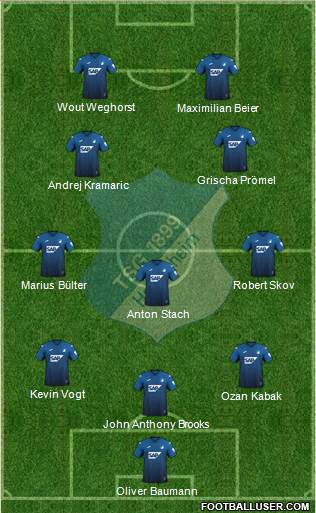
Lots of reorganizing from the American trainer at the break. Grischa Prömel and Ozan Kabak joined Bülter in taking a seat on the bench. Pavel Kaderabek, Kevin Akpoguma, and Florian Grillitsch were the new additions. Matarazzo kept his opening constellation in place while employing side shifts on every axis. Kevin Vogt moved into central defense while John Anthony Brooks went wide left. Robert Skov switched sides to make way for Kaderabek. Anton Stach took Prömel’s position. Strikers Wout Weghorst and Maximilian Beier flipped slants.
Lineup—Hoffenheim—46th minute (3-3-2-2)
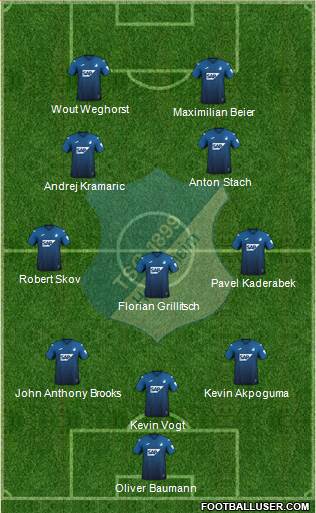
Though this did produce a quick equalizer from Skov (assisted by Kaderabek no less) everything else counted as a bust. Brooks and Vogt had difficulty sorting out their assignments. Brooks lunging into Akpoguma caused the penalty. The attack never regained its flow following the 48th minute equalizer. Hoffenheim again looked hopeless at home against an uninterrupted FSV onslaught. Jan Siewert’s Nullfünfter remained effective, apart from finishing of course, in a stable 4-2-3-1.
Lineup—Mainz—Match 12 (4-2-3-1)
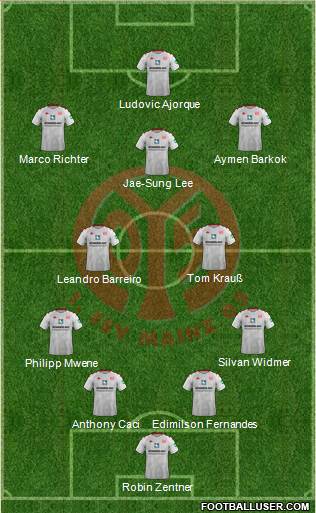
Something different from the coach hitherto primarily concerned with re-instituting Bo Svensson’s system. Much of this was born out of necessity. Dominik Kohr and Sepp van den Berg both had to serve accumulated yellow suspensions. Maxim Leitsch was out injured. For the “nth” time this season, the Pfälzer had to turn to non-central-defenders at the back. Normal fullback Anthony Caci and natural midfielder Edimilson Fernandes actually did a bang-up job. Both makeshift CBs won well over 70 percent of their challenges.
Of course, the most important thing to keep in mind insofar as Mainz are concerned is the return of captain Silvan Widmer. The Swiss skipper aided his team immensely on both sides of the ball. Fernandes – also responsible for unlocking Richter on the team’s lone goal – played his best match yet at his makeshift position with all the extra space Widmer accorded him. Barkok had to start in place of the injured Karim Onisiwo, who would have finished at least one of Barkok’s major chances. On the plus side, Richter proved an absolute beast on the left.
This performance left one feeling that Mainz should indeed be picking up plenty of points soon. Striker Brajan Gruda looked very strong in relief. Jonathan Burkardt (gasp) even made a late cameo appearance. As injuries and suspensions continue to clear, Siewert shall preside over the revival that absolutely should have taken place under Svensson. A good team under solid tactical guidance. Siewert made it work with a plethora of players out of position. Matarazzo had two players for every position, yet still managed to screw things up.
“Weekly Wortschatz”: Round 12
“seifig”
With heavy late autumn rainfall pounding the Bundesrepublik this week, we’ve heard coaches, players, and even match officials citing the “seifig” pitch conditions when discussing their results. The adjective literally translates to “soapy” and one won’t find another online dictionary or translation engine that lists it as anything else. Here we have – mercifully – an example of why human beings with experience aren’t in any immediate danger of being replaced by artificial intelligence. Would any English speaker encounter the phrase “a soapy pitch” without thinking that an algorithm translated it?
For Germans, the connotations are clear. A “soapy bath” implies a “slippery” path out of the tub. The word “slippery” (or the older English conversion of “seifig” into “soppy”) is the proper translation in this context. Long live human beings with critical thinking ability! No matter how refined algorithms become, we’ll still be needed. We’re capable of segueing topics as well! What happened to FC Bayern München trainer Thomas Tuchel’s “critical thinking ability” as his side squared off against Köln on a “slippery and soppy” pitch on Friday night?
By his own admission, the ideas simply didn’t come.
Lineup—Bayern—Match 12 (4-2-3-1)
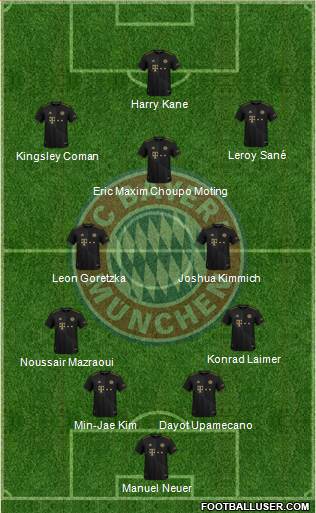
The same XI and formation from start to finish. It’s been 13 years since this occurred within the ranks of the German record champions. The tactically inclined among us tend to agree with the FCB trainer. Even if the scoreline suggests that the Bavarians merely eked out a victory, at no time did the German giants really appear in danger of dropping points. Everything functioned smoothy. The reunited midfield tandem of Joshua Kimmich and Leon Goretzka dominated the midfield. Eric Maxim Choupo-Moting put in an inspired turn as a ten, creating chance after chance with Harry Kane.
What else worked
At this point, we’re all forced to concede that Konrad Laimer honestly stands capable of excelling at any position. The Austrian international stands tall in whatever role Tuchel thinks out for him. We’ve seen him thrive as a solo-six, holding-six, and double-six in addition to his notable performances in the right fullback hole left by Bayern’s failed transfer window. The only real exception to this came in the Pokal, when Tuchel called upon Laimer on short notice. He liked lost and unprepared in that one instance.
Somehwat surprising to discover that Laimer has only picked up three assists on 18 collective scoresheets this year. If one counts “pre-assists”, however, he’s racked up an additional five scorer points. Only Granit Xhaka, Romano Schmid, and Laimer’s FCB teammate have done better in this regard. Admittedly, football fans (this one included) aren’t entirely behind the “pre-assist” metric just yet. Depending on how the play developed, sometimes these can be misleading. Reviewing Laimer’s tape proves otherwise.
We should also mention the fact that Noussair Mazraoui also played well in his first deployment on his unnatural side. What worked for Bouna Sarr last round worked for the Moroccan this time. Tuchel demonstrates his chops as a trainer with the manner in which he’s handled the fullback situation thus far this year. What Julian Nagelsmann currently tries with the German national team provides a stark contrast. Oliver Kahn and Hasan Salihamidzic look like geniuses now for their decision to dismiss their previous coach.
The (non) strength of the opponent
Bayern maintained a “cruise control” feel about them throughout the latest win. Tuchel correctly kept his hands off the gear shift. Bearing in mind that they were facing the league’s worst attack, no changes were really necessary. We’ll give Effzeh trainer Steffen Baumgart a draw-up in order to check on the latest “solution” to Köln’s problems. Be advised that the constellation below is damn hard on the eyes. Baumgart pushed everyone further back in the second half. The Geißböcke made no real attempt to chase an equalizer.
Lineup—Köln—Match 12 (3-4-3)
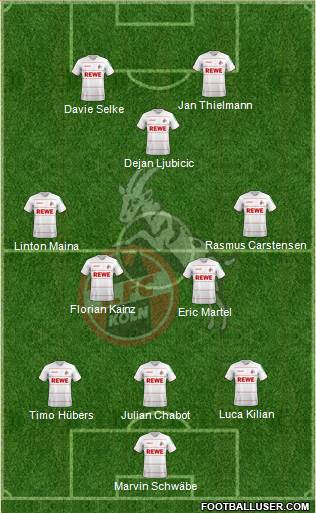
Ugh. It keeps getting worse. Nothing much positive to report on here. The back-three did an, all things considered, halfway decent job of holding the menacing FCB attack at bay. That’s really about it. The potential of actors such as Florian Kainz, Dejan Ljubicic, and Jan Thielmann no longer appears tappable. Baumgart lords over real problems now. Everyone struggles confidence-wise. League watchers struggle to think of a way out of this hole. It’s going to get worse. One can bank on that.
“Trainertyp”
Outside of German footballing circles, there was surely little interest in an unglamorous match up in sleepy (yet sunny!) little Breisgau. Bundesliga enthusiasts pumped their interest up after – with Torsten Lieberknecht back from his personal leave – two sympathetic “Trainertypen” (an impromptu German word invention, “trainer-types”) got a chance to meet in the German top flight for the first time in ten years. Streich and Lieberknecht both share the distinction of being retained by their clubs despite getting relegated.
Streich survived Freiburg’s relegation following the 2014/15 campaign. Lieberknecht – in charge of Eintracht Braunschweig for a decade – kept prowling the sidelines for the Lower Saxons even after they went down just one year prior. Continuity matters for German football fans, particularly in a year in which we’ve already lost Bo Svensson and Urs Fischer. Lieberknecht’s Lillies won’t be escaping the relegation fray this year. Lieberknecht’s position nevertheless doesn’t appear untenable. His players respect him. By all accounts, so does the club.
Streich’s efforts to nail down some workable tactics got dealt a huge blow this week when it was revealed that young German sensation Merlin Röhl wouldn’t be available this weekend. Lieberknecht obviously faces much bigger problems with all the injuries and suspensions within his squad. It piqued interest to see how the respective coaches would line their teams up. A pair of 3-4-3 was the answer. Accordingly, the match didn’t always deliver enthralling football. We’ve still some talking points to highlight.
Lineup—SC Freiburg—Match 12 (3-4-3)
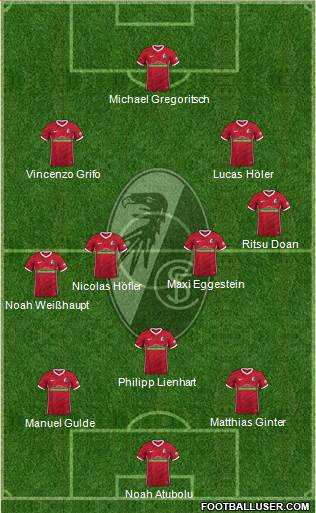
Michael Gregoritsch returned to the SCF starting XI for the first time since match-day four. Streich staggered the midfield in order to coax something out of Ritsu Doan and Noah Weißhaupt on one of those “slingshot” positional assignments. Gregoritisch and Doan got their looks in, though one certainly expected much more from Weißhaupt. Moving Philipp Lienhart up on the pivot helped out the defensive line considerably. A win remained in reach for the hosting Schwarzwaldverein all afternoon. Some over performing from Lieberknecht’s constellation ensured that the match ended in a 1-1 draw.
Get a load of this:
Lineup—Darmstadt—Match 12 (3-4-3)
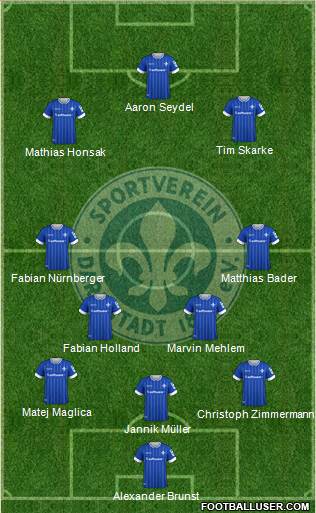
What? Ballsy stuff from Lieberknecht. If you had to look up Aaron Seydel, Jannik Müller, and Alexander Brunst, the columnist assures you that you are in good company. The entire central vertical axis was a veritable “who’s who” of…who? Faint recollections of Seydel and Müller were conjured up with a little help. Keeper Brunst, who saved his side with a couple of spectacular late saves, might as well have just dropped in from another planet. Never heard of the 28-year-old forced into duty due to Marcel Schuhen experiencing thigh problems.
Somehow, it worked despite a nasty injury to Christoph Zimmermann, a horrible match from Tim Skarke on his unnatural side, and a whole lot of nothing going on with the midfield press. The league’s worst defense remained compact enough to keep Freiburg out of the area. Matthias Honsak deflected an effort in. Honsak, Seydel, and Marvin Mehlem did carve out some worthy chances. Defending on set-pieces showed market improvement, even though the Hessians did concede one goal off a corner.
Without knowing how much Lieberknecht was able to influence the squad in training this week, the unorthodox selection did seem to exhibit better-drilled defensive stability. The sympathetic “Trainertyp” has his finger on the one problem he can solve. Namely, keeping the team competitive against more talented opponents. With the grand total of one goal from a striker (Oscar Vilhelmsson) this season, that’s all this newly promoted side can desperately cling to. Relegation still seems likely, but the club does have a sharp character on the bench.
Switching to Streich
It surely proved frustrating for the German coaching legend to watch his side’s winless streak in the league extend to four matches. The DFB Pokal exit still stings for those of us with SCF sympathies. General personnel problems persist. A weak and error-prone midfield can’t seem to find the curve. Neither can rookie keeper Noah Atubolu. Streich the laudable “Trainertyp”, all sympathies aside, can do a better job getting some productivity out of the players he has available. A writer brash enough to suggest that Freiburg could compete for Europe this year, demands more sensible tactics.
Thanks so much for reading! You can catch the release of all Peter’s columns (and occasionally catch him goofing off) on whatever the hell they’re calling twitter these days @PeterVicey.
Twitter DMs are open for football conversations, corrections, and (if you truly insist) general abuse.
Full color re-posts of the columns are eventually archived on Peter’s website.
Related stories
Source From: Bulinews.com
Source link
- Sonic Review – The World #1 App Allows You To Launch Your Own AI Streaming Platform Preloaded With Over 100 Million Artists, Playlists, Podcasts, Genres, Audiobooks & Radio Channel And Tap Into 600 Million Paid Members!
- Voixr Review – The #1 Emotional-Based-Human-Like Voice Cloning AI Powered App Cloning and Speaking In 1,800+ Voices With 144 Native Languages Instantly Without Recording or Any Tech Skills!
- SiteRobot AI Review – The #1 AI-Powered App Let Us Build Complete Websites + Contents Instantly By Using Just Your Keyword!
- Quillaio Review – Get Your Website Ranking In Page 1 With The Most Powerful AI Engine And Hand Free Optimization Of Your Contents!
- MailDaddy Review – The New Email Marketing Software Helps You Send Unlimited Emails To Unlimited Subscribers By Getting 99.96% Inbox Delivery With Assurance To Get More Opens, Clicks, And Sales!









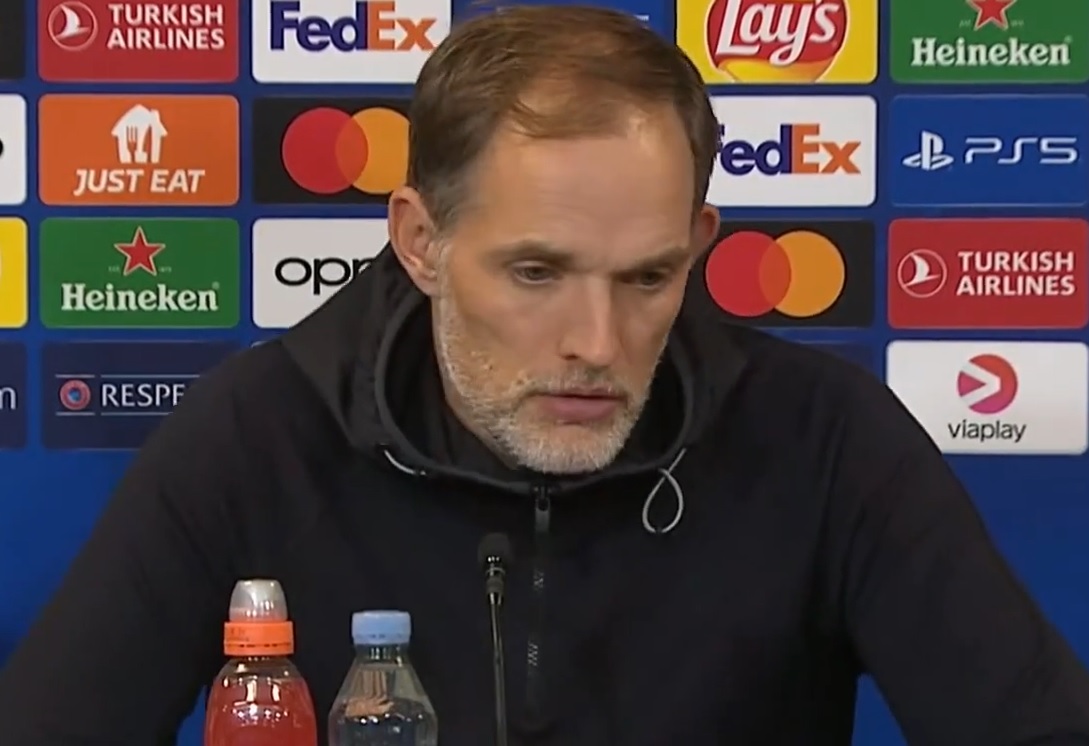
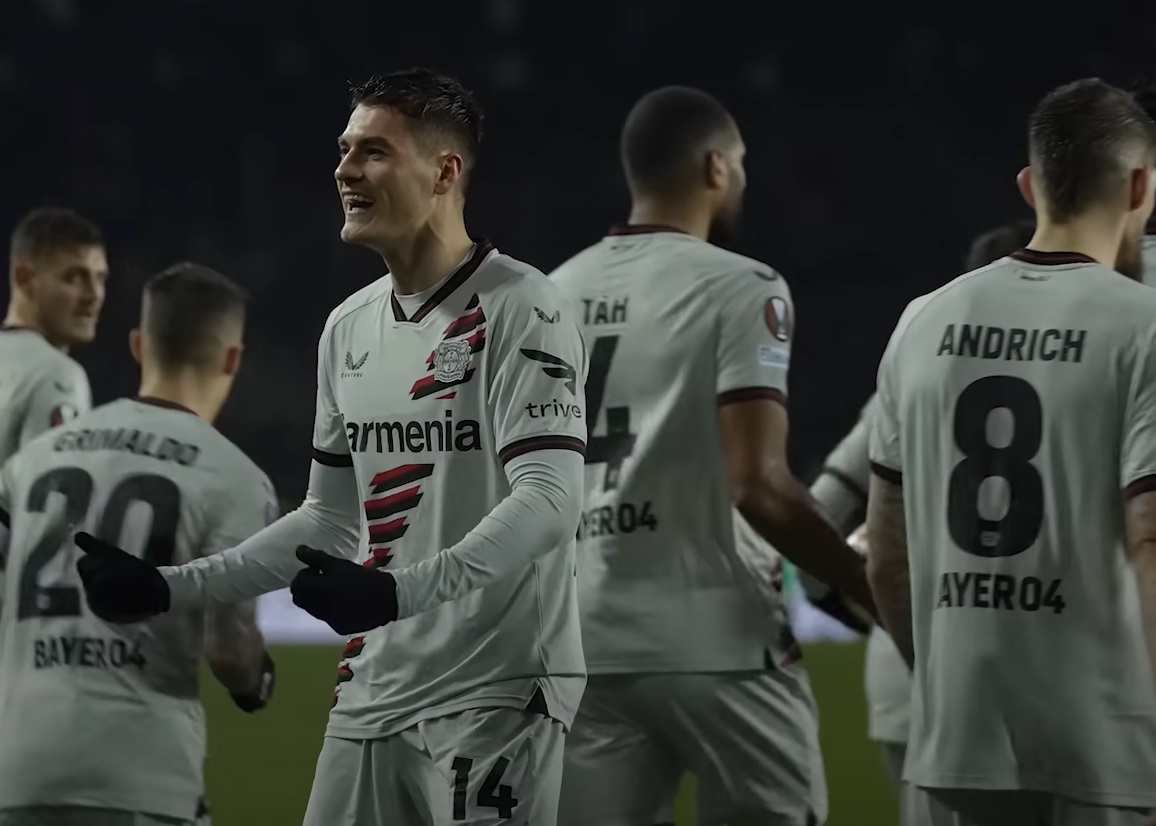
Recent Comments